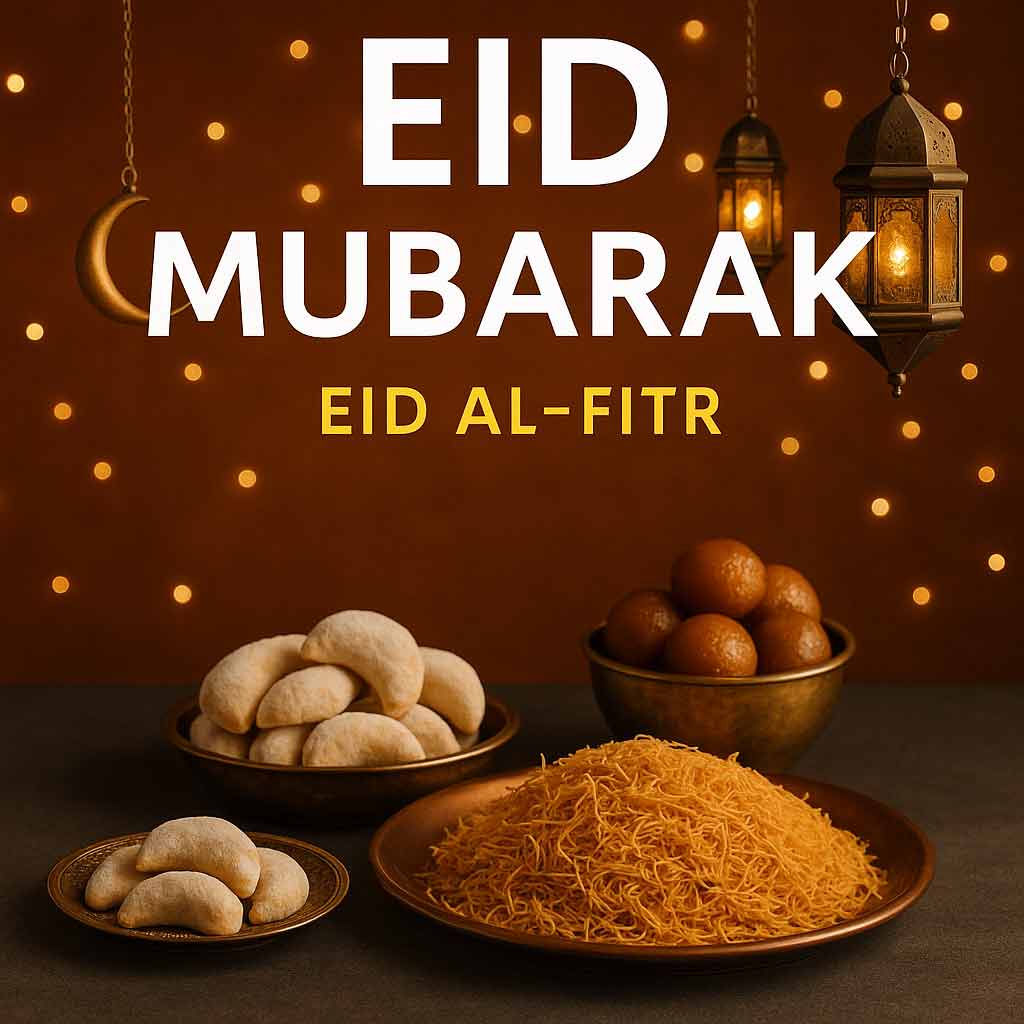Eid-ul-Fitr
– The Festival of Breaking the Fast

Eid-ul-Fitr – The Festival of Joy, Gratitude, and Brotherhood
Eid-ul-Fitr, often referred to simply as Eid, is one of the most important and joyous festivals in Islam. It marks the end of Ramadan, the holy month of fasting, and the beginning of Shawwal, the tenth month in the Islamic lunar calendar. The term Eid-ul-Fitr translates to “Festival of Breaking the Fast,” and it is a celebration of faith, compassion, gratitude, and community.
The Significance of Eid-ul-Fitr
Eid-ul-Fitr has deep spiritual and social significance. It celebrates the successful completion of a month-long journey of self-discipline, prayer, charity, and reflection. During Ramadan, Muslims fast from dawn to sunset, refraining from food, drink, and worldly pleasures to purify the soul and develop empathy for those less fortunate.
Eid is a reward from Allah for this devotion and self-control. It serves as a reminder to express gratitude for the strength and patience granted during Ramadan and to share blessings with others through acts of charity and kindness. It reinforces the core Islamic values of faith, humility, and brotherhood.
The Beginning of Eid
The celebration of Eid-ul-Fitr begins with the sighting of the new moon, signaling the end of Ramadan. The announcement is often made by local mosques or Islamic authorities. This sighting varies by geography, which is why Eid may be celebrated on different days across the world.
Before attending prayers, Muslims perform an obligatory act of charity known as Zakat al-Fitr (or Fitrana). This small donation ensures that even the poor and needy can participate in the festivities. It is typically given in the form of food or its equivalent monetary value and must be distributed before the Eid prayer.
The Eid Morning Rituals
The morning of Eid is a time of joy and spiritual fulfillment. The day starts with an early morning bath, wearing new or clean clothes, applying perfume, and eating a few dates — a practice following the Sunnah (tradition) of Prophet Muhammad (peace be upon him).
Muslims then gather in mosques or open grounds (Eidgahs) for a special prayer known as Salat al-Eid, usually held shortly after sunrise. The prayer is accompanied by a sermon (khutbah) reminding the congregation of unity, gratitude, and the importance of helping others.
The atmosphere is vibrant and filled with greetings of “Eid Mubarak” — meaning “Blessed Eid.” It’s a heartfelt expression of goodwill and happiness shared among family, friends, and even strangers.
Feasting and Festivities
After a month of fasting, Eid-ul-Fitr is a time to enjoy delicious food and celebrate togetherness. Families prepare traditional dishes and sweets that vary across regions but share a common theme of abundance and joy.
In India, popular Eid delicacies include Sheer Khurma, a sweet vermicelli pudding cooked with milk, dates, and dry fruits; Biryani, Kebabs, and Haleem. Homes are decorated, and tables overflow with treats for guests. The sharing of food symbolizes love, unity, and the spreading of joy among communities.
Children eagerly anticipate Eidi — small gifts or money given by elders — which adds a special charm to the day. People visit relatives and friends, exchange gifts, and extend kindness to all, embodying the true spirit of Eid.
The Message of Eid
Beyond the celebrations, Eid-ul-Fitr carries a profound message of peace, forgiveness, and gratitude. It reminds Muslims to continue the virtues practiced during Ramadan — compassion, honesty, patience, and generosity — throughout their lives.
Eid also strengthens social bonds. By giving charity, sharing meals, and visiting loved ones, it fosters a sense of unity and equality. In Islam, all are equal before Allah, and Eid serves as a day when barriers of wealth, status, and background are forgotten.
Eid-ul-Fitr in India and Around the World
In India, Eid-ul-Fitr is celebrated with great enthusiasm. Streets and bazaars come alive with lights, food stalls, and the aroma of festive dishes. Mosques like Jama Masjid in Delhi or Mecca Masjid in Hyderabad witness thousands of worshippers offering prayers in unison. The sense of community and joy transcends religion — people from all backgrounds exchange greetings and join in the celebrations.
Around the world, Eid is observed with similar devotion but unique cultural touches. In the Middle East, grand feasts and community gatherings dominate. In Indonesia and Malaysia, it’s marked by family reunions and traditional attire, while in Western countries, Muslims gather in parks or community centers to celebrate their faith and identity.
Eid-ul-Fitr is more than just a festival — it is a celebration of life, faith, and unity. It marks the culmination of spiritual renewal and the triumph of self-discipline and compassion. The joy of Eid lies not only in the feasts and festivities but also in its message — to live with kindness, share blessings with others, and express gratitude for the countless gifts of life.
As the crescent moon shines bright, the words “Eid Mubarak” echo across the world, carrying with them the universal hope for peace, happiness, and togetherness.
